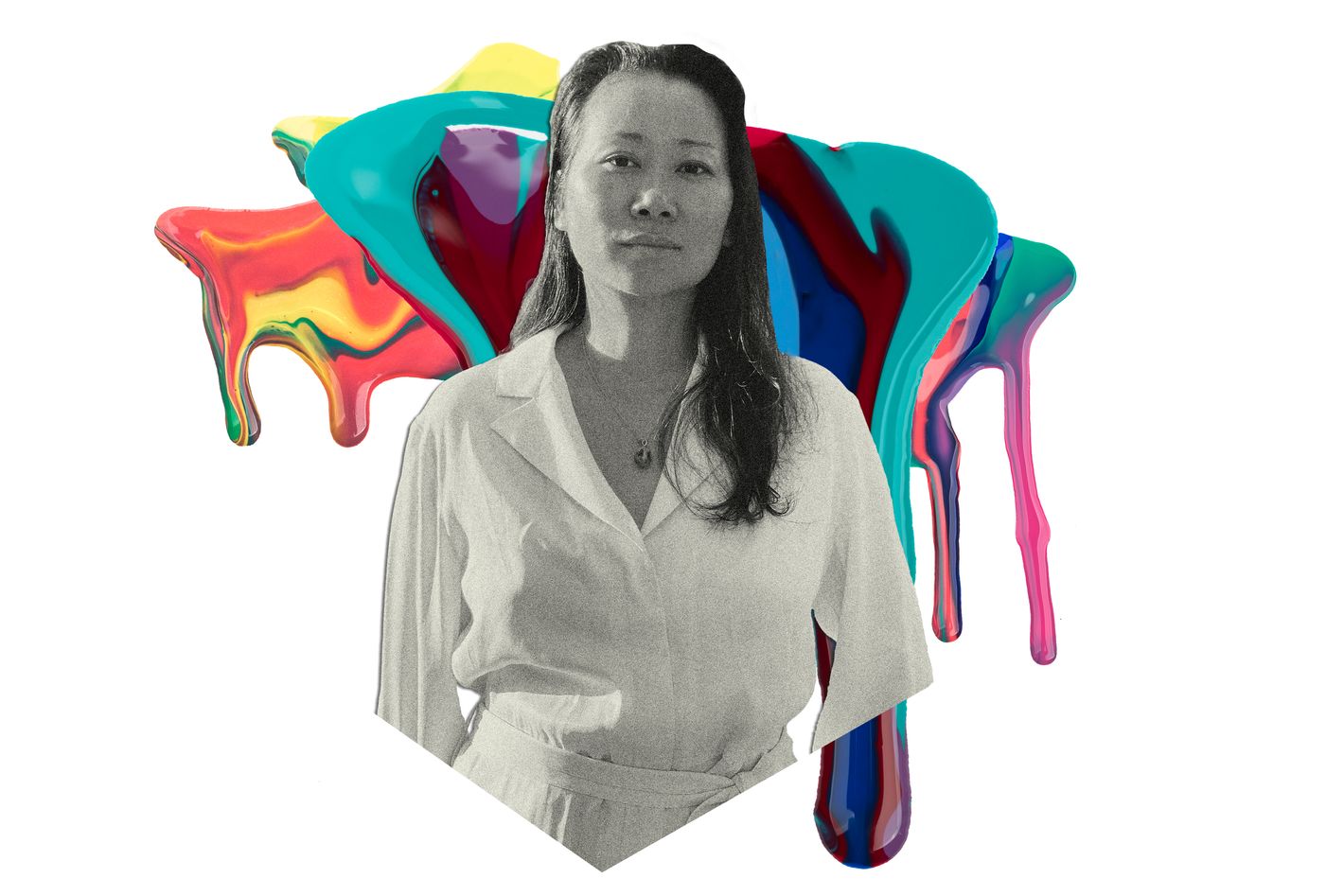
Wen Zhou, the CEO and co-founder of 3.1 Philip Lim, got her first glimpse of the garment industry working on the floor of a Canal Street factory when she was 12 years old. After immigrating with her family from China in 1985 and landing in an NYC Housing Authority project, she worked alongside her relatives to help support the household until she was 15. Even as a teenager, she knew she was good at bringing her community together — “I was the youngest employee of the month at a McDonald’s on 23rd Street,” she says, “and I remember recruiting all of my Chinatown friends and school friends to that McDonald’s” — but she went on to enroll at FIT without a clear idea of what she wanted to do with her life. “Designing isn’t my thing. I don’t know how to sketch,” she says. “I always was very interested in business. But I didn’t know about management. I didn’t know anything.”
Then a breakthrough introducing her to the world of high fashion came in the form of a reception job at a fabric firm. Zhou eventually dropped out of college to start her own textile company before launching one of the most successful independent-design labels in the U.S. She’s since supported her business partner and the company’s creative director, Phillip Lim, through two CFDA Awards and built a multimillion-dollar fashion empire that she’s certain will outlive her. “It will mean something to our community forever and ever,” she says. All the while, Zhou, now 51, has raised two children, partially as a single mother. She lives in Manhattan with her partner and teenage son. Here’s how she gets it done.
On her experience working in a garment factory:
From 12 to 15, I worked in a Chinatown factory. That’s where I really learned what it meant to make garments. I worked there with my mom and my grandmother. They were sewers and seamstresses, and I was part of the packaging crew. My younger sister was nine years old working there too. We would go to school, we’d get off at three, work from three to seven, then go home with my mom at 7:30. And then we would cook together and do our homework. It was sort of like babysitting — it was the community keeping us safe and not having to go home by ourselves — and we made some extra money for the family to pay off our debt. So it was a win-win situation. I had such a good time. I made friends and I speak fluent Cantonese because of that experience.
On how she got her start in fashion:
There was a midtown fabric firm looking for an assistant, like a swatch-cutter, and I got hired. That’s when my world changed, because the world before was Chinatown, garment factory, McDonald’s, home life — very insular. I realized that there’s a world of fashion that I’ve never known, which is showroom, air conditioning, beautiful clothes, models. I mean, when I was delivering these packages to Donna Karen and Ralph Lauren, I had to go through the back door. But what I’d see of the showrooms was so beautiful. I was fascinated by the business and I started becoming a salesperson for the firm rather than just the swatch-cutter and receptionist. I love people. I get them. I know what they’re looking for, and I know how to bring it to them. So I quickly started generating a lot of revenue for the company, and was able to take a commission for the sales that I generated. I started making real money, and I thought, I’m having fun. I’m learning so much. I need to do this.
On her morning routine:
I love sleep. I have no problem sleeping and I could sleep standing up. When I wake up, it’s usually at 7:00 a.m. and my first text is to my son, “Are you awake?” I want to get him to school on time. He’s 17 years old. I shouldn’t have to do this, but sometimes the alarms just don’t work for him. If I don’t get a response, I’m going to his room, knocking on his door. Then I go downstairs, make my coffee, and just stare out to the garden. My garden is my sanctuary.
I usually walk to work. It’s 22 minutes door to door. While walking, I’m working through all of these scenarios in my head. It’s like when you’re preparing a meal, you’re making a mental list, you’re buying ingredients. I’m re-organizing my ingredients to have a successful day. I try to get to the office by 9:30, 9:15.
On the importance of being home for dinner:
When I have no events, no dinners, I try to be home when my son gets home. He’s a junior in high school and he has one more year left; I’m not sure if he’s ever moving back after college. He comes back from volleyball at 6:30, and I would be making dinner at that time. We always share a meal together. When I say sharing a meal, he’s not really sitting down. He’s like, “Mom, I got five minutes. I have to go do homework.” So he eats over the kitchen sink, shoving food in his mouth at a speed where it’s kind of gross, and I’m catching up with him on his day.
On managing stress:
I tend not to think about my work or my life as something I have to manage actively. I don’t let the problems I need to solve become a stressful thing for me. When things do get overwhelming, whether I’m trying to manage cash for the business, or an event or a relationship, I tend to slow down and think, What is my worst-case scenario? What is my best-case scenario? And then, I’ve done this before. I know how to do it. So then let’s move forward.
On unexpected challenges in her job:
I do a lot of things that people don’t expect me to do simply because I have this important-sounding title. I still FaceTime my factory, support my production team, and explain to them how I want the garments to look or do quality control. The other day I found a button — one of the cuffs was missing a button — and it was on the floor. I immediately got on the call with the quality control director in China because these people have been working with me for 20 years. I’m like, “Wilson, look, they missed the button.” It’s important to him and it’s important to me. It’s not my job, but if I don’t make great products, it doesn’t matter how great my marketing is. It doesn’t matter how great my business distribution is. If I don’t make an incredible product that deserves what we charge on the price tag, then I don’t deserve to have a business.
On being her own assistant:
Both Phillip and I don’t have personal assistants. I would love one eventually, but at the moment, I’m on my own schedule. I am efficient. I try to take a few minutes each morning and a few minutes each night to organize my thoughts and look at my calendar. I’m actually getting much better at this. I hate booking my own tickets though. My small luxury is to continue to work with my travel agent.
On not taking maternity leave:
My son was born and I think a week later we won the CFDA award. I accidentally took a business call on my BlackBerry after I gave birth. It was a buyer from Barneys. It was a very important call, but I guess I didn’t think about it that way. I didn’t think about maternity leave at that time because I was young. I was active. I was very lucky, I was very healthy. So I returned to work seven days later. But if I had to do it all again, I would not have done that. I went with Philip to receive the award and I had to pump at the CFDA party.
On her parenting philosophy:
I have a very specific way that I wanted to raise my kids that’s perhaps different from my immigrant mom, who gave me so much love that was suffocating. Not that I didn’t love my kids, I just wanted to give them space. I want them to fail. I want them to learn on their own. Throughout their entire childhood we had two, three babysitters, and they still come for Thanksgiving. My mom, my dad, my sister, her boyfriend, everybody took turns to babysit. Because I had such great help, I was not very involved with their schools. I mean, 3.1 was just going insane. I didn’t know how to manage that. As a mom, I constantly feel guilty about these things. But according to my kids, that was a healthy thing to do.
Last night we were having dinner, my son and I and a friend, and she asked a question: “Are you proud of your mom? How do you feel about having a mom like yours?” My son goes, “It’s actually pretty stressful.” And we talked about that. For me, the stress was very different than his generation. My stress growing up was how to rescue my mom and dad out of poverty. My thing was, I need to make money so that they don’t have to live in the projects. The first thing I did was I bought them a house in Forest Hills. My son and my daughter, I think, they look at me and what I did for my parents, and their reflection is, Well, what am I going to do for my mom? You know, How am I going to compete with that? They don’t need to compete. We’re proud of them, however and whoever they choose to be. But I think that there’s an invisible pressure, and that’s something that we have to discuss with a therapist.
On keeping reasonable working hours:
I’m not working 80 hours a week. My secret weapon is that in every single division, every single team, we have great leaders. I have experts that know how to do their job much better than I can. I’m really there as a guardrail when they need it. Along the way, we’re just checking in. There’s no huge surprises. There’s no derailment. Philip always says that working in fashion is a team sport that we’re playing. We’re in it to be getting better, and we support and promote each other’s excellence. Sometimes I feel guilty, like, Oh, what should I be doing? But I try not to use that mindset. I try to think about that as, You know what? I’ve done enough today and that’s okay. I deserve a break.
Danya Issawi , 2024-05-20 13:00:48
Source link


